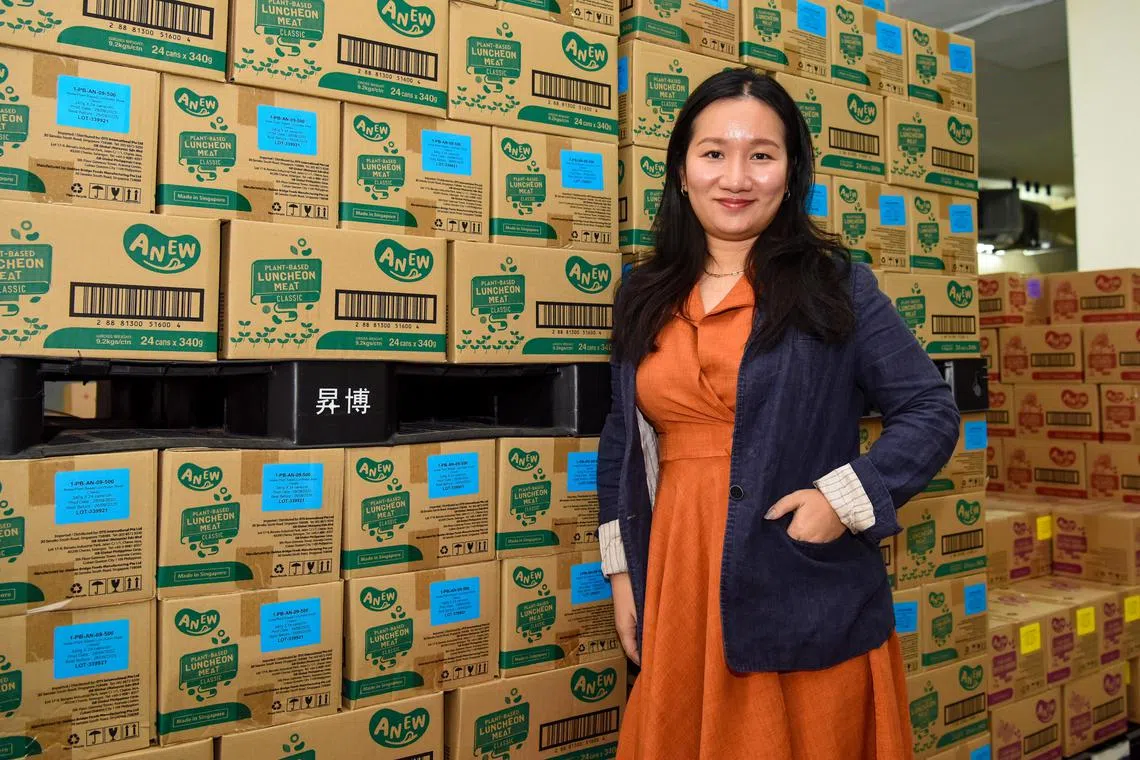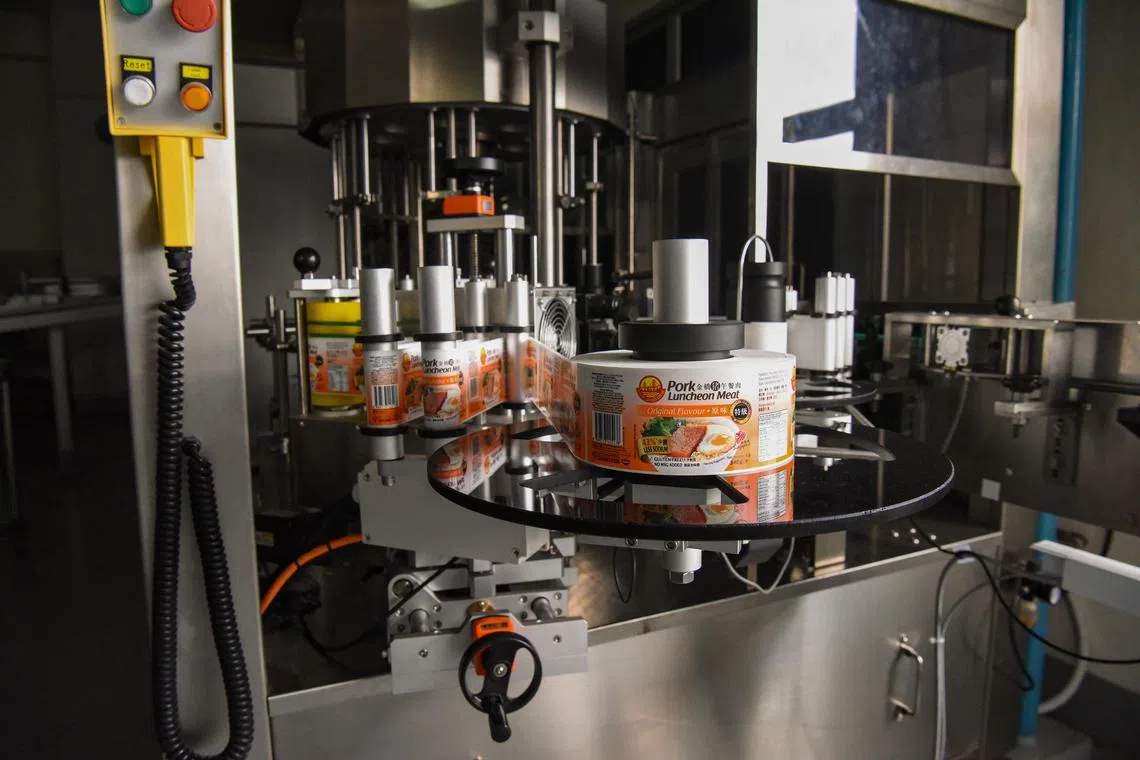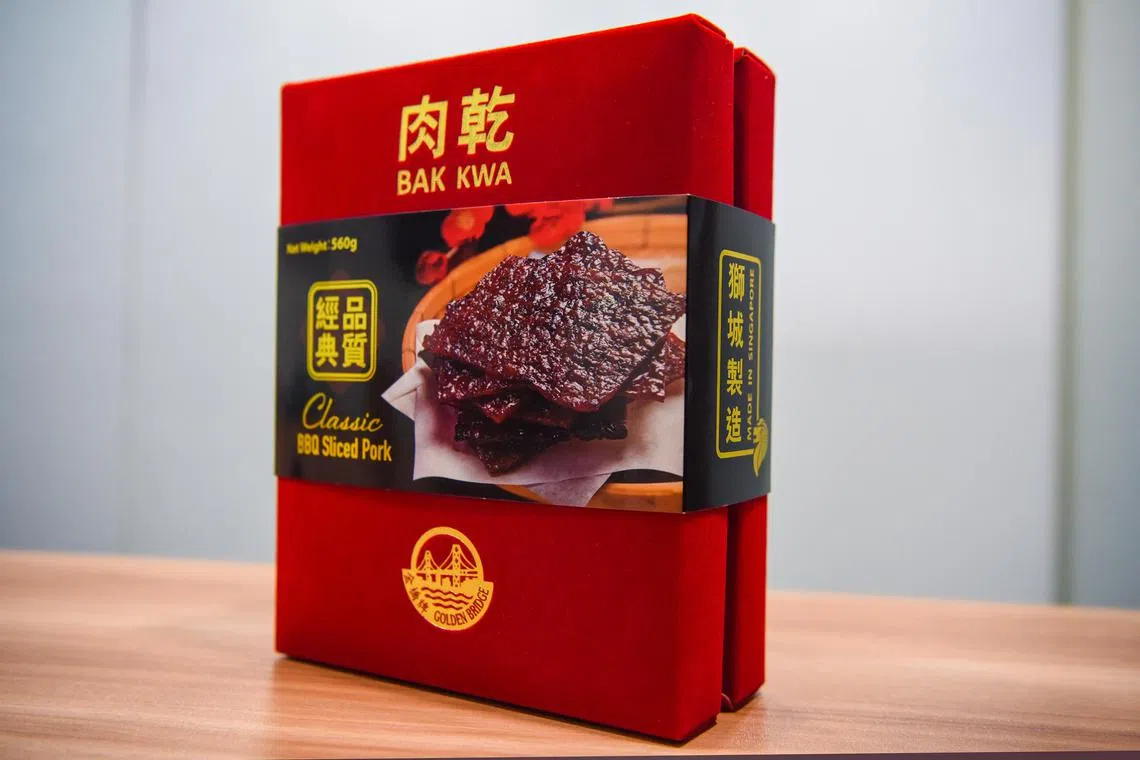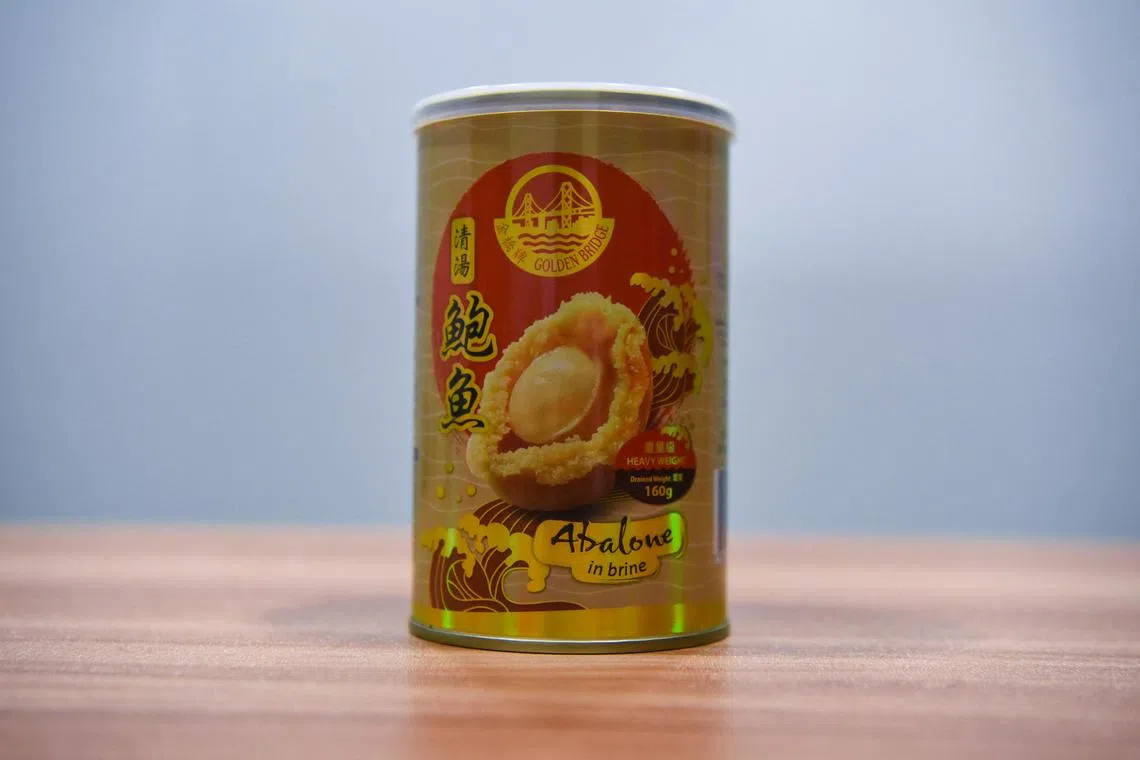Singapore company Golden Bridge’s golden formula for success
Sign up now: Get ST's newsletters delivered to your inbox

Ms Ong Shiya stands in front of cartons of the company's plant-based products, Anew.
ST PHOTO: EUGENE TAN
Follow topic:
SINGAPORE – People who grew up in Singapore know that when it comes to luncheon meat, there is that go-to brand from China. Grown-ups wax lyrical about pan-fried slices of pink canned meat in sandwiches, in a bowl of instant noodles or over rice. They indulge in nostalgia, even if food safety fears or sodium overload stops them from indulging in that pleasure from childhood.
For canned stewed pork, there is yet another household name from China. What else are you going to use for beehoon braised with the contents of those cans, vegetables optional?
And, of course, for lup cheong and other waxed meats for claypot or fried rice, Hong Kong is the place to shop for the artisanal stuff.
With quiet audacity, Singapore company Golden Bridge has been giving people here alternatives to these well-established brands and purveyors. It celebrates its 30th anniversary this year, having started in 1993 with just one product – lean waxed sausages, or lup cheong, with XO brandy in it.
Today, the umbrella company that runs Golden Bridge and its other brands, OTS Holdings, makes more than 1,000 variations of products in 14 categories, including waxed meats, canned meats, meat floss, charcuterie, condiments and ready-to-eat food.
The Ong family is behind it, and three of them run OTS Holdings, the name taken from founder Ong Tuan Seng’s initials. His children – Madam Ong Chew Yong, 63, is the executive director, Mr Ong Bee Chip, 60, the managing director, and Mr Ong Bee Song, 69, the sales director.
Revenue was in the mid-$20 million in the two years before Covid-19 struck – $23.9 million in 2018 and $26.3 million in 2019.
The home-cooking boom during the pandemic and the setting up of the company’s distribution network in Malaysia in 2019 helped revenue reach $34.5 million in 2020. It rose to $38.5 million in 2021, before settling at $34.1 million in 2022, with the lifting of dining restrictions after the pandemic.
Upstart start-up
How did this company take on established names? The answer seems to be a combination of business acumen, meeting consumer demands and figuring out what they want before they know what they want.
The late founder Mr Ong, who died in 2013 at the age of 84, grew up in a family of pig farmers. Instead of going into the business, he started working as a delivery assistant, then became a lorry driver. He set up a logistics company, and then three more businesses, dealing with vehicle repair, textile printing and textile printing machinery.
Golden Bridge was his fifth business venture. His granddaughter, Ms Ong Shiya, 37, the holding company’s brand manager, says two relatives had started a business making lup cheong in the 1980s. Mr Ong saw potential in the food business and decided to take it over. That was how Golden Bridge Foods Manufacturing came to be.

Golden Bridge founder Ong Tuan Seng (front) with (back from left) Madam Ong Chew Yong, Mr Ong Bee Chip and Mr Ong Bee Song – three of his 10 children.
PHOTO: GOLDEN BRIDGE
She says: “He enjoyed drinking XO cognac, and he thought of using it in the sausages. It was our unique selling point – no one else in the market had thought of that.
“Lean sausages came about because consumers had become more sophisticated over the years. He scaled back on the amount of fat in the sausages to fit local taste preferences. In Hong Kong, people prefer super fatty ones, but we wanted to cater to consumers here.”
Golden Bridge now makes a range of waxed sausages, including the original XO Special Lean Sausage, Chicken Wine Sausage and Liver Sausage.
In the beginning, Ms Ong says, the company marketed the product to restaurants. The lup cheong was also sold in wet markets and dry goods stores. In 1995, the lup cheong started to be stocked in FairPrice supermarkets.
Mr Ong’s next move was not to venture into canned food, a natural extension of those shelf-stable waxed sausages. Instead, he started making and selling chilled Taiwanese sausages in 1999, all the rage as a pasar malam snack at the time.
Madam Ong says: “Golden Bridge was one of two brands at that time to make Taiwanese sausages. It was quite unheard of for companies to expand from waxed sausages to chilled and frozen products.”
That led, in 2004, to a new brand, Kelly’s, which started with chilled and frozen hams and sausages. The brand, Ms Ong says, is meant to evoke the image of a caring mother.
It was in 2009 that Golden Bridge debuted its canned luncheon meat. The original flavour, still sold today, is made with 43 per cent less sodium than other brands and contains no MSG.
Madam Ong says: “We thought there was an opportunity to introduce higher quality luncheon meat to local consumers. There were no local manufacturers producing luncheon meat, and the China food industry was rife with food quality and food safety scandals.”
Indeed, in August 2007, the Agri-Food and Veterinary Authority suspended two canned meat processing plants in China from exporting to Singapore, after detecting a banned antibiotic – fed to pigs – in their products during routine monitoring. The suspension affected the Maling and Narcissus brands. It led to supermarkets shelves being stripped bare of canned pork, as shoppers stockpiled these products. The suspension was lifted at the end of 2008.
OTS Holdings, which has about 150 employees, makes most of its products in a 9,131 sq m factory in Senoko, which has halal and non-halal wings. It also has a factory in Pulau Bulan, Indonesia, which manufactures food for the market there and works with contract manufacturers in Malaysia to supply that country.
The meat, Ms Ong says, is from sources approved by the Singapore Food Agency and comes from Canada, Brazil and countries in Europe.
Changing tastes
New products sprang forth thick and fast. In 2009, the company started producing halal chilled and frozen hams and sausages and, in 2010, started selling halal shelf-stable, chilled and frozen meat products under the El-Dina brand.
As people’s taste buds became ever more sophisticated, the company started offering Iberico pork luncheon meat in 2017 under the Kelly’s brand. It is made with 100 per cent Iberico pork from Spain. The black Iberian pigs, fed on acorns, are said to have a rich, nutty flavour. Two years later, the brand debuted Truffle Pork Ham, in line with a slew of truffle oil-infused products on the market at the time. A 200g can of Kelly’s Truffle Pork Ham costs $4.24 at FairPrice supermarkets.
Ms Ong says: “We grew alongside the Singaporean consumer.”
That led to the company launching Anew, its plant-based range, in 2022. Aside from Singapore aiming to be a hub for researching and developing alternative proteins, the new brand, Ms Ong says, is also in response to customers.
“Sustainability has been a huge topic since before Covid,” she says. “The management is always looking into the business and seeing how else to grow it. With our existing know-how with proteins, they thought we should move into the plant-based arena.”

Golden Bridge’s can-labelling machine seen on Aug 24, 2023.
ST PHOTO: EUGENE TAN
The three-member in-house research and development team came up with the formulation for Anew’s canned plant-based luncheon meat using soya protein. Also in the range are plant-based rendang, butter chicken and bolognese sauce, which come in retort pouches.
A 250g pouch costs $6.30 on RedMart, while a 340g can of Anew luncheon meat costs $5.45, also from RedMart.
“Growth for the past year, compared with the rest of the group, has not been significant,” Ms Ong says.
“But we knew from the get-go that Singapore would be a small market. Anew is meant to meet consumer needs across borders.”
The brand is exported to Indonesia, and the company is looking to distribute it in Europe and Dubai. Meanwhile, it is also developing new products, including plant-based jerky.
Branching out
Apart from Singapore, the company’s products are sold in Malaysia, the Philippines, Indonesia, India, Brunei, Hong Kong, Myanmar, Australia and New Zealand.
It hit paydirt in Australia in 2022, when Costco, a chain of more than 50 warehouse-type stores that sell everything from furniture to electronics to food, started carrying Golden Bridge’s lup cheong (A$22.99 or S$20 for 720g) and bak kwa (A$21.49 for 420g). This June, an Asian living in Sydney posted on social media photos of the bak kwa he had bought at one of the chain’s stores. That gained traction and there was a bump in sales.
“I think that shows there is demand for more Asian products in Australia,” Ms Ong says, adding that the company is in talks with Costco to develop new products for that market. “We are still identifying the needs of the huge Asian population there.”
The company will introduce bak kwa in gift boxes, something “not readily available” in Australia.

Packaging for Golden Bridge's bak kwa, for sale in Costco Australia.
ST PHOTO: EUGENE TAN
More ready-to-eat food is another area the company is looking to develop.
Ms Ong says: “In certain markets, there are consumers who no longer cook. They prefer to eat out, or pull out something quick and fast to eat from their office drawer. So, we will focus on convenience and price value.”
For Chinese New Year, Golden Bridge came up with festive offerings such as canned Buddha Jumps Over The Wall in 2018 and 2019, and lup cheong made with Iberico pork in 2020 and 2021. It will start offering canned abalone for the festive celebrations next year, priced at $25.90 for a 425g can.

Golden Bridge's new product for Chinese New Year, canned abalone.
ST PHOTO: EUGENE TAN
These are available online and will be sold at a food fair in September. The inspiration behind this latest offering came from the China company that supplies it with cans for its products. It pointed Golden Bridge to abalone farmers and suppliers in Nanri Island in Fujian, which has an established fishing industry.
Canned abalone is a competitive arena, but that has not stopped the Ongs. There seems no end to looking for ways to expand the business, to push ahead.
The patriarch, Ms Ong says, did just that, even after he retired in 2000 at age 71. In 2007, he started a property investment company.
She says he tooled around in his biggest indulgence, a Bentley GT Continental Coupe, and also went back to his farming roots by growing organic fruit and vegetables for his family of 10 children, 30 grandchildren and 35 great-grandchildren.
They used to live near each other, she says of her grandfather.
“In the morning, on the way to work, a Bentley would drive past me,” she says. “There goes Ah Gong.”


